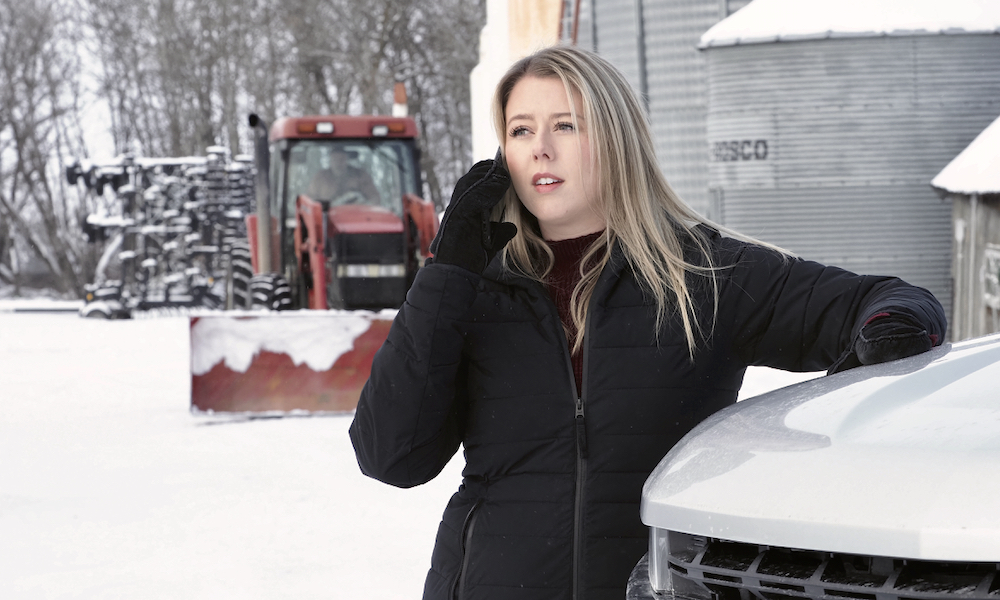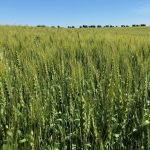While growing up, Jackie Dudgeon figured she would go to school and then be on her way. She had no plans to join her dad growing canola, wheat and soybeans on their Darlingford farm, a couple hours southwest of Winnipeg. But after she spent a summer working off-farm blending fertilizer, treating seed and delivering chemicals for a local agriculture retailer, Dudgeon changed her mind.
“I fell in love with agriculture,” she says. Like a lot of today’s next-generation farm kids, though, her story got a bit more complicated.
Dudgeon began planning to come back to the farm after graduating from the University of Manitoba with a diploma in agriculture and business management. But her dad had a different idea. He insisted she take an off-farm job first.
Read Also

Farm & Family – Feb 27 edition
Last week, we highlighted part one of a two-part series by GFM associate digital editor Geralyn Wichers about why you…
“My dad wanted me to go out, get a little more experience, network,” she recalls. “He didn’t go right back to the farm either … he worked in an accounting firm and as a land appraiser and did some other jobs and he thought it was pretty valuable.”
Dudgeon has spent the past 10 years working in the agriculture industry, taking on roles ranging from educating customers and building brand awareness to establishing long-term objectives and developing business plans for companies such as DuPont, JL Agronomics and Canterra Seeds.
The experience, she says, has made her more confident about eventually stepping into the role of successor on the family farm.
In addition to building business experience that will help move the farm into the future, Dudgeon says there was another benefit from a decade of off-farm experience.
“I’ve amassed a huge network of agriculture professionals that I wouldn’t have had, or had the experience to go out and get, if I’d gone back to the farm right away. The experience and answers I get from these people is invaluable.”
Changing with the times
This trend toward encouraging — or requiring — the next generation to boost their management skills by acquiring off-farm experience has been slowly gaining ground for decades. In the last 10 years, though, it has really picked up steam.
In past, the shoe was often on the other foot. “It wasn’t that unusual for farmers to need off-farm incomes to support the farm,” explains Bob Tosh, a Saskatoon-based farm business advisor with MNP.
Now, though, it’s not so much a money thing. Instead, what the kids are bringing back is a heightened level of business insight, says Tosh. “As farms get bigger, there is more of a trend toward prioritizing education and other experiences before returning to the farm.”
It’s just so much more complicated to run today’s farms, not just because of how they’re structured and the way they’re financed and managed, but also because of the partnerships and business deals they tap into.

Farmers have always believed in hands-on learning, and in a business context, the place where tomorrow’s farm strategies are being implemented today is often in well-managed, cutting-edge businesses.
Besides, farms are also getting smarter about how to get the most out of off-farm opportunities, and they’re sharper too about what kinds of jobs can have the most relevance to their needs. They also know what to look for to be sure their next generation is developing the right attitudes and aptitudes.
Which off-farm jobs are the best?
While almost any experience can be invaluable, producers and successors are finding that not all off-farm farm jobs are created equal.
Len Davies, a business transition planner with Davies Legacy Planning Group in Muirkirk, Ont., believes successors will learn more working for a lending institution than driving a combine on another farm.
Davies encourages farm families to require at least two years of off-farm employment in an area of the agriculture industry that has the most potential to benefit the farm’s future. For example, working in agricultural finance could help with farm planning and accounting, a role in a machine shop could provide essential experience for equipment servicing and repair, and a job as a crop consultant could lead to better farm management.
“In operations where successors have worked two or three years off the farm, they are head and shoulders over someone who goes straight to work on the farm and never gets that (additional) perspective,” says Davies.
For successors who do take off-farm roles with the intention of eventually returning full-time, Watson recommends “open communication between the current and next generation to ensure expectations are clear, understood and being met to work towards a smooth transition into the farm and an opportunity to bring the knowledge gained off-farm, back to the farm.”
Accepting the risks
Meanwhile, though, there’s also a growing need for some farm kids to come back home as soon as they can. It’s because of COVID-19, and can make an off-farm detour seem just too expensive.
Simply put, the kids are needed back home. There is a shortage of farm labour, and no one can fill the jobs back home like a highly motivated and ambitious family member.
A recent report from the Canadian Agricultural Human Resource Council found the COVID-19 pandemic has led to widespread worker shortages. One in five roles is unfilled, exacerbating a nationwide farm labour deficit that is expected to double by 2029. If successors are willing workers, operators might be hard-pressed to encourage them to seek off-farm employment, especially if the farm is short of labour.
And there’s another risk too, says Davies. The successor might come to love their off-farm jobs and the non-farm lifestyle. In fact, this is exactly what happened in Davies’ own career.
At his father’s direction, Davies took an off-farm job but planned to return after he’d gained some additional experience. Instead, he liked what he saw, and he never did go back to the family dairy farm, working instead in a progression of ag industry positions.
It’s a concern many of his clients ask about during succession planning, because farmers aren’t just farmers, they’re parents too.
Davies tells clients it’s almost always best to open the door to off-farm work. “I ask them, ‘Don’t you want the best for your children?’ If they (the children) feel the farm is the best thing, they’ll come back,” he says.
Not the right path for everyone
In Ontario, young farmer Justin Williams says his dad encouraged him to pursue off-farm employment before returning to Wilhome Farms at Picton.
“I always knew I wanted to come back to the farm. My dad said ‘You should work off-farm — but I’m not forcing you,’ and I think that came from his wishing that he would have (taken an off-farm job) to get other experience.”
But the eighth-generation producer knew his future was on the family farm and didn’t want to delay his return. In 2009, after completing a two-year agriculture diploma at the University of Guelph, Williams joined his dad, working on the dairy and row crop operation full-time.
“I already knew the history of the farm and how we do things. It was an easier transition for me and it just felt right,” he says. “Coming fresh out of university, I had new ideas I wanted to implement sooner than later (and) if you work off-farm you may lose those ideas before coming home to the farm.”
Williams acknowledges the downsides to returning to the family farm instead of pursuing off-farm employment. Margins are tight and the farm pays less than a corporate nine-to-five. It also requires working long hours, often in sub-zero temperatures and blowing snow instead of in a temperature-controlled cubicle, but Williams has no regrets about returning to the farm after graduation.
As for the connections, knowledge and skills that come from off-farm jobs, Williams believes there are more opportunities than ever to develop those things without having to work off the farm.
“My social network is so much bigger than the one my parents or grandparents had,” he says. “I made connections with so many different people in the agriculture industry in college and through the Canadian Young Farmers Forum … I’m not missing out.”
The key drivers
“More and more farmers are recognizing the benefits of treating the farm like a business and striving to adopt common business practices on the farm to stay competitive,” says Heather Watson, executive director of Farm Management Canada.
Although there aren’t any hard numbers on farm kids who go straight to work on the family farm versus those who work off-farm before returning home, there is a trend toward encouraging successors to gain off-farm experience.
And it’s paying off as it helps the farm profit from critical insights into how other businesses are structured and run.
Nor is it only the business insight they get, Watson says. It can also be eye-opening for everyone when the next generation goes to work for a different employer with an expectation that they will show they can succeed.
Says Watson, “Farmers are keen to give their children the best chance for success, and to recognize the benefits of expanding their horizons before returning to the farm — not only for the benefit of the children but for the farm as well.”
For Dudgeon working off-farm was the right call.
“From my experience, it was the best-case scenario,” she says. “My dad 100 per cent views me differently. He’s watched me grow, seen what I’ve been able to accomplish and that gives him confidence, and he knows I’m more prepared for it now than I would have been 10 years ago.”
















